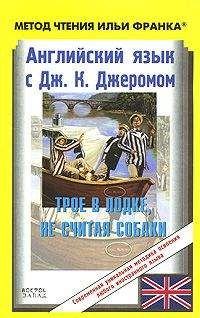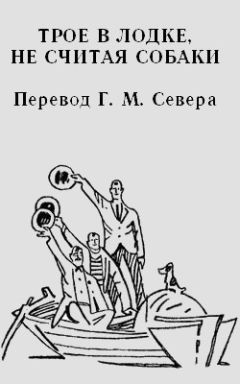Jerome Jerome - Английский язык с Джеромом К. Джеромом. Трое в лодке, не считая собаки
And they are so confoundedly impertinent, too, over it (и они еще страшно нахальны /при этом/). You can whistle till you nearly burst your boiler before they will trouble themselves to hurry (можете = приходится свистеть, пока почти не взорвется котел, прежде чем они соблаговолят поторопиться). I would have one or two of them run down now and then (я бы топил пару лодок время от времени), if I had my way, just to teach them all a lesson (будь моя воля, просто чтобы преподать им всем урок).
impertinent [ɪmˈpǝ:tɪnǝnt] trouble [trʌbl]
At Reading lock we came up with a steam launch, belonging to some friends of mine, and they towed us up to within about a mile of Streatley. It is very delightful being towed up by a launch. I prefer it myself to rowing. The run would have been more delightful still, if it had not been for a lot of wretched small boats that were continually getting in the way of our launch, and, to avoid running down which, we had to be continually easing and stopping. It is really most annoying, the manner in which these rowing boats get in the way of one's launch up the river; something ought to be done to stop it.
And they are so confoundedly impertinent, too, over it. You can whistle till you nearly burst your boiler before they will trouble themselves to hurry. I would have one or two of them run down now and then, if I had my way, just to teach them all a lesson.
The river becomes very lovely from a little above Reading (река становится очень красивой немного выше Рэдинга). The railway rather spoils it near Tilehurst, but from Mapledurham up to Streatley it is glorious (железная дорога несколько портит ее у Тайлхерста, но от Мэплдерхема до Стритли она великолепна). A little above Mapledurham lock you pass Hardwick House, where Charles I. played bowls (немного выше Мэплдерхемского шлюза проплываешь мимо Хардвик-Хаус, где Карл Первый играл в шары/в боулинг). The neighbourhood of Pangbourne, where the quaint little Swan Inn stands (округа Пэнгборна, где находится старинная маленькая гостиница «Лебедь»), must be as familiar to the habitués of the Art Exhibitions as it is to its own inhabitants (должно быть, так же хорошо знакома завсегдатаям художественных выставок, как и ее /округи/ жителям).
My friends' launch cast us loose just below the grotto (баркас моих приятелей отцепил нас чуть пониже грота; to cast — бросать, кидать, сбрасывать; loose — свободный, неприкрепленный), and then Harris wanted to make out that it was my turn to pull (и Гаррис захотел сделать вид, что сейчас моя очередь грести; to make out — разобрать, различить; сделать вид, притвориться). This seemed to me most unreasonable (это показалось мне совершенно необоснованным; unreasonable — неразумный, неблагоразумный, необоснованный). It had been arranged in the morning that I should bring the boat up to three miles above Reading (утром условились, что я проведу лодку на три мили выше Рэдинга). Well, here we were, ten miles above Reading (и вот мы десятью милями выше Рэдинга)! Surely it was now their turn again (конечно, теперь была снова их очередь).
habitué [hǝˈbɪtjueɪ] exhibition [,eksɪˈbɪʃ(ǝ)n]
The river becomes very lovely from a little above Reading. The railway rather spoils it near Tilehurst, but from Mapledurham up to Streatley it is glorious. A little above Mapledurham lock you pass Hardwick House, where Charles I. played bowls. The neighbourhood of Pangbourne, where the quaint little Swan Inn stands, must be as familiar to the habitués of the Art Exhibitions as it is to its own inhabitants.
My friends' launch cast us loose just below the grotto, and then Harris wanted to make out that it was my turn to pull. This seemed to me most unreasonable. It had been arranged in the morning that I should bring the boat up to three miles above Reading. Well, here we were, ten miles above Reading! Surely it was now their turn again.
I could not get either George or Harris to see the matter in its proper light, however (я не смог заставить ни Джорджа, ни Гарриса увидеть дело в должном свете = не сумел убедить ни того, ни другого, однако); so, to save argument, I took the sculls (поэтому, чтобы решить спор: «избавиться от спора», я взял весла; to save — сохранить, сберечь, сэкономить). I had not been pulling for more than a minute or so (я не греб больше минуты = не успел я погрести и минуты), when George noticed something black floating on the water, and we drew up to it (как Джордж заметил что-то черное, плывшее по воде, и мы приблизились к нему; to draw up). George leant over, as we neared it, and laid hold of it (Джордж наклонился вперед, когда мы приблизились к предмету, и схватил его; to lean; to lay hold of). And then he drew back with a cry, and a blanched face (затем он отшатнулся с криком и побледнел: «с криком и побледневшим лицом»; to draw back — снимать, отдергивать; отходить назад, отступать).
It was the dead body of a woman. It lay very lightly on the water (это было мертвое тело женщины), and the face was sweet and calm (и ее лицо было кротким и спокойным). It was not a beautiful face (оно не было красивым лицом); it was too prematurely aged-looking, too thin and drawn, to be that (было слишком преждевременно состарившимся, чересчур худым и сморщенным, чтобы быть таковым = красивым); but it was a gentle, lovable face, in spite of its stamp of pinch and poverty (но это было спокойное, милое лицо, несмотря на отпечаток нужды и бедности; pinch — щепоть, щепотка; крайняя нужда; стесненное положение, невзгоды), and upon it was that look of restful peace that comes to the faces of the sick sometimes when at last the pain has left them (и на нем было то выражение безмятежности и спокойствия: «спокойного мира», которое появляется иногда на лицах больных, когда наконец боль покинула их).
prematurely [,premǝˈtjuǝlɪ] poverty [ˈpɔvǝtɪ]
I could not get either George or Harris to see the matter in its proper light, however; so, to save argument, I took the sculls. I had not been pulling for more than a minute or so, when George noticed something black floating on the water, and we drew up to it. George leant over, as we neared it, and laid hold of it. And then he drew back with a cry, and a blanched face.
It was the dead body of a woman. It lay very lightly on the water, and the face was sweet and calm. It was not a beautiful face; it was too prematurely aged-looking, too thin and drawn, to be that; but it was a gentle, lovable face, in spite of its stamp of pinch and poverty, and upon it was that look of restful peace that comes to the faces of the sick sometimes when at last the pain has left them.
Fortunately for us — we having no desire to be kept hanging about coroners' courts (к счастью для нас — у нас не было желания, чтобы нас заставляли таскаться по коронерским судам; to hang about — торчать, бродить вокруг, околачиваться) — some men on the bank had seen the body too, and now took charge of it from us (какие-то люди на берегу тоже увидели тело и взяли на себя заботу о нем).
We found out the woman's story afterwards (мы узнали историю этой женщины впоследствии). Of course it was the old, old vulgar tragedy (конечно, это была старая-престарая пошлая трагедия). She had loved and been deceived — or had deceived herself (она любила и была обмануты — или сама обманулась). Anyhow, she had sinned — some of us do now and then (так или иначе, она согрешила — /как и/ некоторые из нас грешат временами) — and her family and friends, naturally shocked and indignant, had closed their doors against her (и ее семья и друзья, разумеется, потрясенные и возмущенные, захлопнули двери перед ней).
Left to fight the world alone, with the millstone of her shame around her neck, she had sunk ever lower and lower (оставленная бороться с миром в одиночестве, с ярмом позора на шее = неся ярмо позора, она опускалась все ниже и ниже; to sink; millstone — «мельничный камень» — жернов; бремя, гнет, груз). For a while she had kept both herself and the child on the twelve shillings a week (некоторое время она содержала себя и ребенка на двенадцать шиллингов в неделю) that twelve hours' drudgery a day procured her (которые давала ей тяжелая работа по двенадцать часов в день; to procure — доставать; добывать; обеспечивать), paying six shillings out of it for the child, and keeping her own body and soul together on the remainder (платя шесть шиллингов за ребенка и удерживая душу в теле на остальное; to keep body and soul together — поддерживать существование, сводить концы с концами).
coroner [ˈkɔrǝnǝ] deceived [dɪˈsi:vd] tragedy [ˈtræʤɪdɪ]
Fortunately for us — we having no desire to be kept hanging about coroners' courts — some men on the bank had seen the body too, and now took charge of it from us.
We found out the woman's story afterwards. Of course it was the old, old vulgar tragedy. She had loved and been deceived — or had deceived herself. Anyhow, she had sinned — some of us do now and then — and her family and friends, naturally shocked and indignant, had closed their doors against her.
Left to fight the world alone, with the millstone of her shame around her neck, she had sunk ever lower and lower. For a while she had kept both herself and the child on the twelve shillings a week that twelve hours' drudgery a day procured her, paying six shillings out of it for the child, and keeping her own body and soul together on the remainder.
Six shillings a week does not keep body and soul together very unitedly (шесть шиллингов в неделю удерживают душу в теле не очень крепко; unitedly — совместно, согласованно). They want to get away from each other when there is only such a very slight bond as that between them (они хотят убежать друг от друга = стремятся расстаться, когда между ними существует лишь такая хрупкая связь, как эта); and one day, I suppose, the pain and the dull monotony of it all had stood before her eyes plainer than usual (и однажды, полагаю, она ясно увидела всю боль и безрадостную монотонность: «боль и монотонность встали перед ее глазами яснее, чем обычно»), and the mocking spectre had frightened her (и насмешливый призрак /смерти/ напугал ее; spectre — привидение, призрак, фантом; дурное предчувствие). She had made one last appeal to friends (она в последний раз обратилась к друзьям; appeal — призыв, обращение; мольба), but, against the chill wall of their respectability, the voice of the erring outcast fell unheeded (но, натолкнувшись на холодную стену их респектабельности, голос заблудшей изгнанницы остался неуслышанным; unheeded — незамеченный, не принятый во внимание); and then she had gone to see her child (тогда она отправилась повидать своего ребенка) — had held it in her arms and kissed it, in a weary, dull sort of way (взяла его на руки и поцеловала, устало и безучастно; dull — тупой, скучный, унылый; монотонный, безжизненный), and without betraying any particular emotion of any kind, and had left it (и, не проявляя никаких чувств, оставила его; to betray — изменять, предавать; выдавать /секрет/; проявлять; particular — особенный, особый; конкретный), after putting into its hand a penny box of chocolate she had bought it (сунув ему в руку грошовую коробку шоколада = конфет, /которую купила ему/), and afterwards, with her last few shillings, had taken a ticket and come down to Goring (а затем, на свои последние несколько шиллингов взяла билет и приехала в Горинг).



